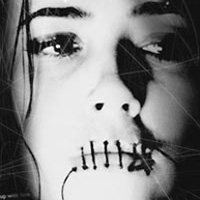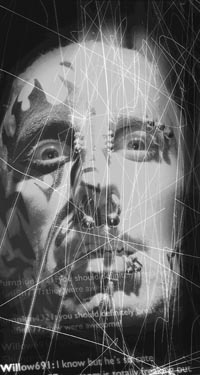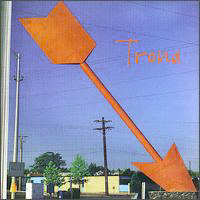 Now Entering Strangeland
Now Entering Strangeland
An interview with Dee Snider
by Michael McCarthy
Some 15 years ago, Dee Snider wrote the Twisted Sister album that would make him a legendary rock god seemingly overnight, though he’d actually worked long and hard for that achievement. The album was entitled Stay Hungry, and among such anthems as “We’re Not Gonna Take It” and “I Wanna Rock,” was a rather progressive, two-part tune entitled “Horror Teria (The Beginning).” Part “A” was dubbed “Captain Howdy,” part “B” “Street Justice.” It was dedicated to Stephen King.
Eventually Snider and his Twisted mates would have a cameo in Pee Wee’s Big Adventure. Having written the Twisted Sister videos, Snider considered screenwriting and proceeded to dive right in, penning numerous screenplays. Among them was Hell Town, an adaptation of “Horror Teria.” Wanting to be the next Freddy Krueger, Snider envisioned himself as Captain Howdy. A few rewrites, years and titles later, he finally gets his wish in StrangeLand, a film arguably more shocking than any installment in the Faces of Death series. In the following interview, he talks about the film, its impending sequels and the future of his musical career, among other things.
When I interviewed you for LiveWire magazine last year, you described having the film in pre-production as almost anti-climactic, explaining that it was like when Twisted Sister finally broke and you were like, “What took so long?” How does it feel now, having StrangeLand in theatres?
Surreal. For one thing, I’m much better adjusted now than I was in the Twisted days. I was angrier back then. I was sort of mad at the world for not recognizing the band and making us work as hard as it did. Now I’ve learned that the process is half the joy of the thing. To sneak into a theatre and see myself on the screen and see people say, “here, I’m gonna take the time from my life that I use for pleasure and watch your movie for enjoyment,” it’s an outrageous feeling. And to see reactions is a rollercoaster because, as I completely expected, the critics hate it. It reminds me so much of the Twisted days, it’s ridiculous. They get vicious about it. I’ve met the people I made this film to appeal to. They’re loving it! Time magazine didn’t like Twisted – who gives a shit? And the fans knew that. As long as Circus and LiveWire liked the band, and Fangoria likes what I’m doing with this movie, that’s where it’s at. To have Siskel and Ebert give it two thumbs up is almost the kiss of death. To have that kind of legitimacy from the get go. You never saw a good review of the bands that I liked. Judas Priest? People magazine? Do you think they liked Iron Maiden? I don’t think so. But I sure as hell did! When they give you a hateful review, they’re promoting the film in a bizarre way.
 I think it is possibly the most disturbing film I’d ever seen in a theatre. Walking out of there, I was surprised that it got an R rating.
I think it is possibly the most disturbing film I’d ever seen in a theatre. Walking out of there, I was surprised that it got an R rating.
Well, we went back and forth to [the MPAA] about four or five times. Finally, they said they would agree to the R if we would include, where it says, “this film is rated R. Contains extreme violence, nudity, profane language” they made us add, “and scenes of torture.” No movie’s ever had that put on it before. I was pretty proud of that. I wasn’t trying to make a gratuitous film, but I certainly wanted reaction. It wasn’t tasteful, but I didn’t show the guy’s genitals. That would have been gratuitous and just pornographic. I just had this silhouette with me in front of this naked guy strung up with his mouth sewn shut and you see the girl watching and crying. They made me cut that. I said, “Why am I cutting that? I didn’t show anything!” They said, “People are suffering too much.” It was that effective in execution, but you really didn’t see much. Their minds just ran away with themselves. People’s imaginations are much worse than anything you could actually put on the screen.
One of the most disturbing elements was Captain Howdy’s dialogue about the psyche of piercing fanatics. How did you research that?
I read a lot of books. Spent time with a great piercer named Keith Alexander, who is in the S.M.F. band. Keith was in the band Carnivore, which was Pete Steele’s first band of note. I met him when I was researching the film. He has his own shop called Modern American Body Arts in Brooklyn. He’s a premiere brander and does scarification. He’s also hooked deep into the S/M and fetish world and was kind enough to share much of that with me. On these long drives between gigs, we’d just talk for hours. He’d say, “Read this book, watch this video, check out this website.” He was paid to be the consultant and help design the piercings and brandings for authenticity. I didn’t want to just throw a bunch of metal in a face. There is rhyme and reason, the way people do things in the body mod community.
Having wanted to be a horror icon for so long, was it easier to play Captain Howdy?
Absolutely. I have not wanted to be an actor. I have dreamed of being a horror icon. Since I wrote “Captain Howdy,” I envisioned it as being more, and I’ve always seen myself playing this part. As a writer, I created him from the ground up, so I don’t know if I could be as effective as an actor in another part. I’d like to think I could, but I wouldn’t say I’m an actor’s actor and I can play anything.
You were very convincing as the rehabilitated man, Carlton Hendricks. So much so that I think you really feel for the guy when he goes out there and says, “I’m sorry.”
I wanted to play with people a little bit there and get them questioning. Everybody, by the end of that scene where they catch him, is going, “Kill him! He’s a piece of shit!” And I said, well, guess what, he’s really a sick person and with help and medication he’s nothing like that at all. All of a sudden you see him in the hospital. I said, “I want to see if I can actually get people to say, ‘God, he really seems OK now.'” Then they come in and kick the shit out of him and hopefully people are going, “Oh, that poor man! That poor man!” That poor man was just torturing people and now you’re feeling sorry for him! I just wanted to play with that whole concept of good and evil. It’s a little vague. In the end, when he comes back to get revenge on the people who hurt him, who’s the good guy and who’s the bad guy? If Gage had done his job and made that call… He’s a cop – that’s what you do! But he couldn’t. And we understand why he couldn’t. But whose fault is it that the guy is now back and madder than ever?
Generally speaking, what are your thoughts on rehabilitation and the insanity plea in reality?
I don’t have a clear cut answer, and I didn’t offer an answer. Some parents have said to me, “Kill him!” I’m like, maybe that’s the answer. I might feel that way, too. The truth is, the whole thing started when I had my first child and became aware of crimes against young people. I wrote those two songs from the point of view of, like, if some scumbag did something to my kid, I would kill him. I was the parent. And when I wrote the film, I was feeling more for the cop with the daughter than I was ever feeling for the schizophrenic sexual sadist. My feelings on the insanity plea? I’m not sure, but I can certainly see both sides. In future films, you find out more and more about this character, that he was tortured as a baby by his own father to the point where his associations with attention from his old man and love are connected directly to pain. How he was just drawn to this community because here’s a place where you can hurt yourself and feel that pain and reignite those feelings from your childhood. That love from your father, in some sick way. This is a sick, sick person. And there are sick people. When you look at that and see he has a chemical imbalance and he was tormented by his old man and nobody’s helped him, and now here he’s got some help and can live a relatively normal life… I don’t know where the answers are.
Was he always going to get off on the insanity plea? I recall he got off on a technicality.
It was a technicality in “Street Justice,” but I changed it to an insanity plea. As I researched, I found out there was virtually no way they could ever let this guy out, even if he hadn’t been read his Miranda. They would lie, they would do anything. The only possible way this guy could get out would be the insanity plea. It would be a natural for him to get it. Also, four years in an institution would be the minimum amount of time he could be there before he might be let out. I also researched the legalities of the whole thing.
Whose idea was it to cast Robert Englund as the man who’d call for Street Justice and how involved were you with the casting?
I had my hands in everything, but we’d have the character name on the wall and the casting director would have photos of possible actors that were being considered. One day I walked into the room and I saw Englund up there. I was like, “Robert Englund?” It was brilliant, to have him play the part of Jackson Roth, the redneck, militia, card carrying-NRA-member, porno-loving, right-winger.
Rather than playing Freddy Krueger, he played the man who would kill Freddy Krueger.
Yeah. And, ultimately, his victim. I couldn’t imagine that we would get him. We were a small film. Also, he’s a horror icon and here I am trying to be a horror icon. I just couldn’t believe it. I thought he’d be perfect and they approached him. He read the script and he loved it. It was great having him there. He was so open and giving on every level.
Is it true that you’re writing the sequel already?
Yeah. I’ve already started outlining it. I’m going to do the research stage first. A number of legal things and precedents. I have to find out exactly what happens to burn victims. But I’ve already been given the go ahead.
Will it be entirely reality-based, or will it venture into supernatural territory?
I feel confident that I can keep it reality-based as long as I’m willing to work with burns. Which is one of the worst things, to me, actually. The reason I picked having him burn at the end is that it’s the worst thing I could think of happening. The worst way to die. So, I have to do some research from medical journals and find out if someone could survive, assuming they came in and put him out. Or the sprinkler system went off. That was an alternative ending we were joking about. Like, cut from the outside and then all of a sudden swoosh! ’cause there is not a building in the country that doesn’t have a sprinkler system in it. That was not reality. A fire like that? Sprinklers. Unless, of course, they hadn’t been properly inspected and kept up. Ah… There’s my out! So, yeah, I’m definitely going for reality-based again. I think it’s a scarier place.
They say a lot of burn victims die because the panic and pain gives them cardiac arrest, but neither the pain nor fear would scare Captain Howdy…
You see where it goes. And imagine the skin grafts!
He could abduct people to take their skin!
There’s all sorts of possibilities. It’s gonna be called StrangeLand 2: The Cult of Personality. Let it just be said that Manson receives thousands of letters every week from fans, who are interested people. There’s a strange thing that happens with characters like Manson that I’m going to play with in the sequel. These people become almost cult anti-heroes. People write about them. The curiosity level just becomes out of control. I really want to get into the whole cult of personality. It’s not just the title of a song. It’s an actual theory. It’s an existing thing that happens with extreme personalities. How they become cult figures.
Last time we spoke, you joked that you fully intended for there to be Hell Town 7: 3-D. Realistically, how many sequels do you want to put out, and how long do you think you could do these films before it reached the point of absurdity that Friday the 13th achieved?
I have no idea, but I’m gonna take it as far as I can. I expect that by the time we get to that one it’ll be PG-13, probably because it’ll be toned down, and because society will become desensitized, as I have. The fact is, when the first Frankenstein came out, people were fainting in the theatres. Now you’re eating Frankenberry cereal. My hopes are, as I said, StrangeLand 7: 3-D. The breakfast cereal and the Universal Studios ride with the rollercoaster going into my mouth. Piercing Howdy Barbie doll. I recognize that there’s virtually no way to really capitalize on your creation without also practically destroying it. The only way to not do it and have it stay in one piece is to walk away from it after the first or second one. Let it be legendary. But then you don’t reap the rewards of literally years and years of work. Once you cross over like A Nightmare on Elm Street, you become more mainstream, you have kids wearing your costumes and you lose your coolness. You don’t have the credibility anymore, but you’ve got the financial rewards for the hard work. It’s a tough one, but I definitely plan on exploiting this and taking it full route. I want to have The Hell Town Chronicles, which will be the TV series or the book series. I’ve already registered a trademark for Horrortourium, a theme restaurant. No shit. [Laughs] I’ve got so many plans and it all comes down to – can I create and portray a horror icon with staying power? The odds of doing it are very, very slim. I believe I’m on the path, so why shouldn’t I enjoy the fruits of my labor and my lottery, so to speak?
You have a new Dee Snider solo track and a new Twisted Sister song on the StrangeLand soundtrack. Are there plans for a Dee Snider solo album or new Twisted Sister album?
The music thing has finally become a hobby for me again, which is great. I have this horrible tendency of turning my hobbies into my work. I like something, so I pursue it and then I wake up and say, “Oh shit, now this is my job.” I’m not complaining. To be able to do the things you love as your job is great, but it loses a certain spontaneousness. Now I’ve gotten that back. When I perform as Dee, I go out and it’s like one-offs, or a weekend, or a week in Sweden. It’s a change of pace. There’s no pressure. No heavy commitment. When I did the song with Twisted Sister, “Heroes Are Hard to Find,” it was a one-off. We had our cake and we ate it, too. We went in, we got a new song on a new album that’s in the stores, it’s being promoted and we didn’t have to commit to anything. I’m getting offers, and I’m not saying I won’t do something, but, to me, music is a sideline now. I’m happy to have it in that position. I’m enjoying it more. My work is radio, the movies and, hopefully, television as well.
When we last spoke, MTM Productions was developing your show, tentatively entitled The Sniders.
MTM was a subsidiary of The Family Channel. The Family Channel was bought by a company that dissolved everything except the satellite space to start the Fox Family Channel. MTM got closed and the deal fell apart. I was then immediately pursued by a major studio, who shall remain nameless at this time, to do a cable show. But they wanted to do it with my actual wife and kids as the cast. Almost at the point of signing in the eleventh hour, I got hold of my senses and said, “I’ve got one of the only successful relationships and family lives in the business. Where will I go if my family is my work?” And so I passed on that deal. They’re now pursuing me about doing a movie of the week, which my family is trying to push me to do. I know full well, “Just take a little bit of heroin and you can walk away.” Yeah, right! If the show works and people start throwing money at me, how am I gonna deal with the wife and kids going, “Oh, c’mon, let’s do the show!”



